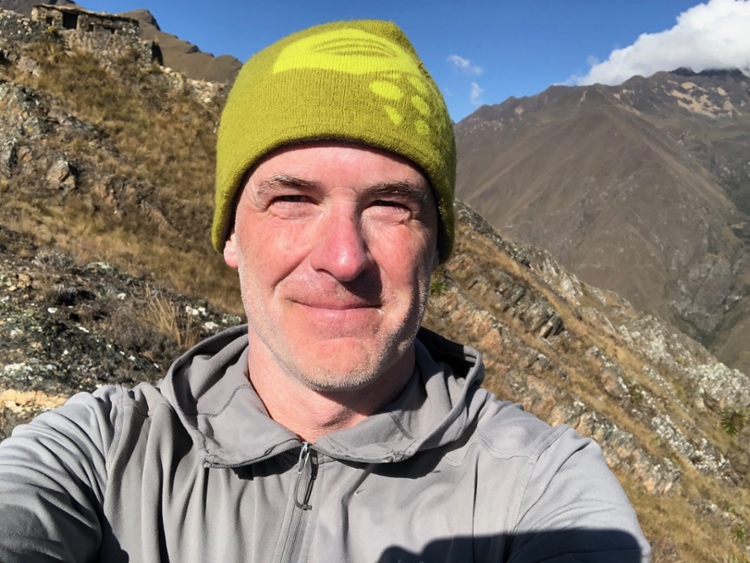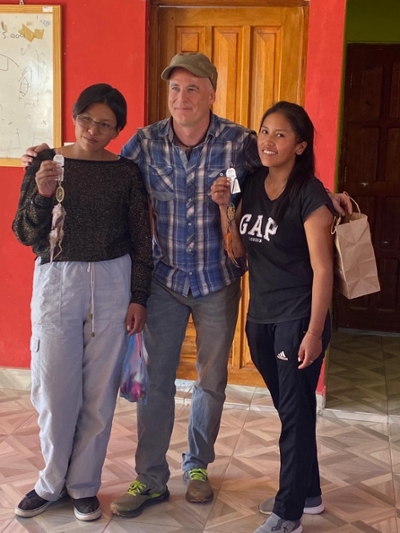
SENS faculty member receives university’s international research award for his community-based work in Latin America
Dr. James Robson (PhD) is being recognized for his decades of community-based research throughout Latin America. His work currently focuses on engaging rural and Indigenous youth in land management and sustainable development.
By Graham D. Fairhurst
Dr. James Robson (PhD) of the School of Environment and Sustainability (SENS) has been awarded the University of Saskatchewan’s 2024 Global Research Leadership Award for Faculty. This award recognizes his exceptional contributions in strengthening USask’s global profile and improving the quality of life in communities through research.
“Dr. Robson’s work exemplifies excellence, purpose, and innovation in community engaged research locally and globally, a core value of the USask’s International Blueprint strategy. Dr. Robson’s work helps youth ignite their passion, own it, and action it. The University of Saskatchewan is proud to honour Dr. Robson and his contributions with the Global Research Leadership Award,” said Dr. Meghna Ramaswamy (PhD), Director of the International Office at USask.
Robson, who is UNESCO Co-Chair in Biocultural Diversity, Sustainability, Reconciliation and Renewal and an associate professor in SENS, has been working in Latin America for over two decades. Throughout this time, his work has expanded from initial projects across Mexico to encompass more of the region, including Argentina, Bolivia (for example, see this video), Guatemala, Mexico, and Peru.
Robson’s work has always been strongly rooted in rural communities that manage local natural resources – resources that are integral to the culture, wellbeing, and livelihoods of community members – and many such communities are Indigenous. He is an internationally recognized expert on the scholarship of ‘the commons’ (i.e., shared resources), and he has worked to understand how change affects the environment, land management, sustainable development, and the opportunities that are available to rural people coping with change.
“In some cases, change can be good. It can bring new possibilities for local economies,” says Robson. “But in other cases, change – and particularly environmental change – can have profoundly negative effects that result in people leaving their rural communities to seek other opportunities for work, often going to bigger urban centres. This is common among resource-dependent communities in Latin America and means those communities need to adapt to maintain collective forms of working and making decisions.”
It is this rural ‘outmigration’, where people move away from their home communities, and its inter-relationships with the environment and sustainable development, that Robson studies. And in recent years, he has been working on solutions to this problem and youth – typically community members in the 16-28 age group – are a key constituent. Robson has been at the forefront of a small number of applied researchers and scholars working in collaboration with remote rural communities on youth engagement and empowerment to understand and support the next generation of land managers in these places.
As Robson explains it, “Communities are concerned about how to bring young people back, because youth could help strengthen and lead their communities to a sustainable future. But we need to know about the barriers youth are facing, how they see their future, and what their aspirations are. How can we best involve youth in conversations around decision-making that affects the community and empower them to be among those actors driving positive change? That’s what my current work seeks to do.”
And Robson is not alone in this work. He has developed an extensive network of partners, many of whom work on the ground with local, rural communities in Latin America. “It really is a team effort. Non-profit organizations, researchers, community leaders, and local people – we are all partners in the work,” says Robson, who also notes, “Ultimately communities need to create sustainable development solutions that are going to be effective. As researchers, we try to support those efforts as best we can. We listen to the local people’s hopes and goals, and we try to create spaces for discussions, facilitate the dialogue, and promote engagement that can help communities realize those goals.”
The work that Robson and his partners have been doing is paying off. For example, Robson has worked with his local partner in Bolivia, Instituto Boliviano de Investigación Forestal (IBIF), to create programs to promote the inclusion of youth in territorial governance and forest management in the Indigenous Territory of Lomerío. Through a promotional video, IBIF has been sharing the success of this initiative with other communities in the region, in the hopes that they might take up similar efforts.
To Robson, it is essential that the results of his work make it to the communities. As he notes, “It’s about reaching youth so they feel connected, know that they are being heard, and understand what is possible. And once youth realize that they can have a productive future in their home community, it’s inspirational to see how transformative that can be.”
Together, we will undertake the research the world needs. We invite you to join by supporting critical research at USask.

